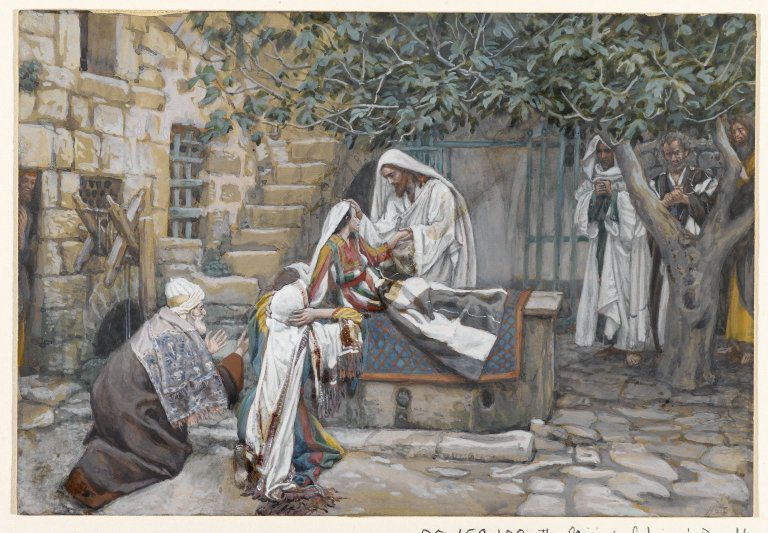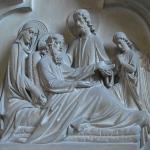
When Jesus had crossed again in the boat
to the other side,
a large crowd gathered around him, and he stayed close to the sea.
One of the synagogue officials, named Jairus, came forward.
Seeing him he fell at his feet and pleaded earnestly with him, saying,
“My daughter is at the point of death.
Please, come lay your hands on her
that she may get well and live.”
He went off with him,
and a large crowd followed him and pressed upon him.
There was a woman afflicted with hemorrhages for twelve years.
She had suffered greatly at the hands of many doctors
and had spent all that she had.
Yet she was not helped but only grew worse.
She had heard about Jesus and came up behind him in the crowd
and touched his cloak.
She said, “If I but touch his clothes, I shall be cured.”
Immediately her flow of blood dried up.
She felt in her body that she was healed of her affliction.
Jesus, aware at once that power had gone out from him,
turned around in the crowd and asked, “Who has touched my clothes?”
But his disciples said to Jesus,
“You see how the crowd is pressing upon you,
and yet you ask, ‘Who touched me?’”
And he looked around to see who had done it.
The woman, realizing what had happened to her,
approached in fear and trembling.
She fell down before Jesus and told him the whole truth.
He said to her, “Daughter, your faith has saved you.
Go in peace and be cured of your affliction.”
While he was still speaking,
people from the synagogue official’s house arrived and said,
“Your daughter has died; why trouble the teacher any longer?”
Disregarding the message that was reported,
Jesus said to the synagogue official,
“Do not be afraid; just have faith.”
He did not allow anyone to accompany him inside
except Peter, James, and John, the brother of James.
When they arrived at the house of the synagogue official,
he caught sight of a commotion,
people weeping and wailing loudly.
So he went in and said to them,
“Why this commotion and weeping?
The child is not dead but asleep.”
And they ridiculed him.
Then he put them all out.
He took along the child’s father and mother
and those who were with him
and entered the room where the child was.
He took the child by the hand and said to her, “Talitha koum,”
which means, “Little girl, I say to you, arise!”
The girl, a child of twelve, arose immediately and walked around.
At that they were utterly astounded.
He gave strict orders that no one should know this
and said that she should be given something to eat.
There are two women.
Well, the first one is not quite a woman yet; she’s a girl. That means she must be under twelve, because if you get much older than twelve, you’re not a girl anymore according to that culture’s rules. Womanhood is something that creeps up on a girl awfully fast: one day they’re a child and the next they’re not. Marriages get arranged soon after a girl is capable of having a baby. Girls get their periods and next thing you know, they get swapped to a man in exchange for a bride price so they can run a home and give birth to the next generation, all in the blink of an eye. That’s the way things work around here.
This girl is not going to live to be swapped or have a baby. She’s about to die.
The second woman is unclean.
That’s how it worked when a woman was bleeding. Women on their periods were unclean. They were people who must not be touched. They weren’t supposed to sit or lie down on anything that couldn’t be washed or thrown away, because anything they sat or laid down on was also unclean. Anyone who touched them, or touched the thing they had sat or laid down on, would become unclean. A person who touched a bleeding woman was required to take a ritual bath and then still be unclean until nightfall. During that time, anything the person touched would be as unclean as they were. That’s how contagious menstrual blood was thought to be. And this woman had been on her period for twelve years straight.
For twelve years, anyone who touched that woman was a pariah until dusk, even after that person took a bath. Anyone who touched a thing she’d sat or laid down on was treated in the same way.
Imagine that kind of isolation.
Imagine that degree of humiliation, for twelve years.
Twelve years of enforced social distancing. Twelve years without any chance at having a baby, in a culture where a woman’s worthiness was judged by how many babies they squeezed out. Twelve years without intercourse with her own husband. Twelve years without hugging or kissing or even holding hands with anybody. Twelve years without praying in a group of people. Twelve years of neighbors shrinking back and holding their clothes clear as she walked by. Twelve years where anybody who accidentally brushes up against her is horrified and disgusted, complaining that now they have to take a bath and stay away from everyone because of her. Because that’s how contagious the blood flowing out of her is thought to be.
That girl and that woman live walking distance from one another. That girl has been alive for something less than the number of days that that woman has been bleeding. That girl has been growing up, playing, learning her prayers, learning to run a home and care for the babies she’s going to have, for something less than the number of years that that woman has been unable to have a baby, unable even to be with her husband, unable to pray in the synagogue, a pariah who mustn’t be touched.
That girl is about to die, having accomplished none of the things that her culture demands a woman accomplish.
That woman is at her wits’ end, and she decides to do something reckless.
That woman decides to walk out of her house and right into a crowd: a crowd of people who hate her and presume God hates her. A crowd of people who, if they notice her, will glare at her for being so inconsiderate as to put them in danger of being unclean like she is. They will shrink away and hold back their garments. Just seeing her will ruin their walk. Touching her will spoil any plans they had for the whole afternoon.
She walks right up to Jesus as He’s coming by, on His way to heal the little girl who is dying down the street.
Thanks to Jesus, nobody notices her. They’re all squashed together to be near Him, to get His attention, to touch Him so that they can receive some of that wondrous healing power He wields. They’re not looking around or minding what they’re doing, so they don’t see the most contagious person in town come up behind them. She touches Jesus’s cloak.
Now Jesus is unclean.
Uncleanness is a thing that spreads like wildfire, and everyone in town is struggling to touch an unclean Man. Everyone trying to grab hold of Him is now unclean. Everyone who bumps up against the people trying to grab hold of Him is unclean as well. Everybody’s day is ruined because of that woman and her dreaded flow of blood. Except that the blood is gone. For the first time in twelve years, she feels it stop. She isn’t bleeding. She isn’t an unclean woman anymore. She has until sunset and then she can take a bath, and go to see the priest, and this ordeal will be over.
Jesus knows exactly what happened. He doesn’t hide His uncleanness. He insists, “Who touched me?” and she falls on her knees– to thank Him or to apologize, which one I can’t say. Perhaps it’s both.
“Daughter,” He says, as if she’s a girl and not a woman. “Your faith has saved you. Go in peace.”
Now everyone knows what happened.
Everyone realizes they’re unclean too.
Jesus moves on to the house where the little girl is dying.
He goes right in, even though He is an unclean man and shouldn’t be welcome. And He finds that the little girl is dead. Dead bodies are unclean, like menstrual blood. You’re not supposed to touch them, but He does. He goes into the room where her lifeless body is lying on a bed.
The unclean Man who was touched by a woman defiled by menstrual blood, touches the unclean hand of the little girl’s corpse. “Talitha koum. Little girl, I say to you, arise.”
And she does.
She is not dead anymore.
She can grow up to be a woman, get married, perhaps have a baby. Perhaps the woman who lives just a short distance away will have a baby as well. They will be unclean for eight days after the baby is born, and then they will bathe and present themselves at the temple, and be clean yet again.
Jesus, now unclean in two different ways, leaves the house. He goes on His way, touching everyone and healing with His touch. In a short time, He will be cast out of town as an unclean thing, and be nailed to a cross and bleed and bleed and bleed until there is no blood left in Him, and in doing so He will give birth to a Church. Everyone who bathes in His blood will be clean, and cured of their afflictions.
All you have to do is touch the unclean God.
But you cannot be ashamed to touch the unclean.
Image via Pixabay
Mary Pezzulo is the author of Meditations on the Way of the Cross and Stumbling into Grace: How We Meet God in Tiny Works of Mercy.
Steel Magnificat operates almost entirely on tips. To tip the author, visit our donate page.













